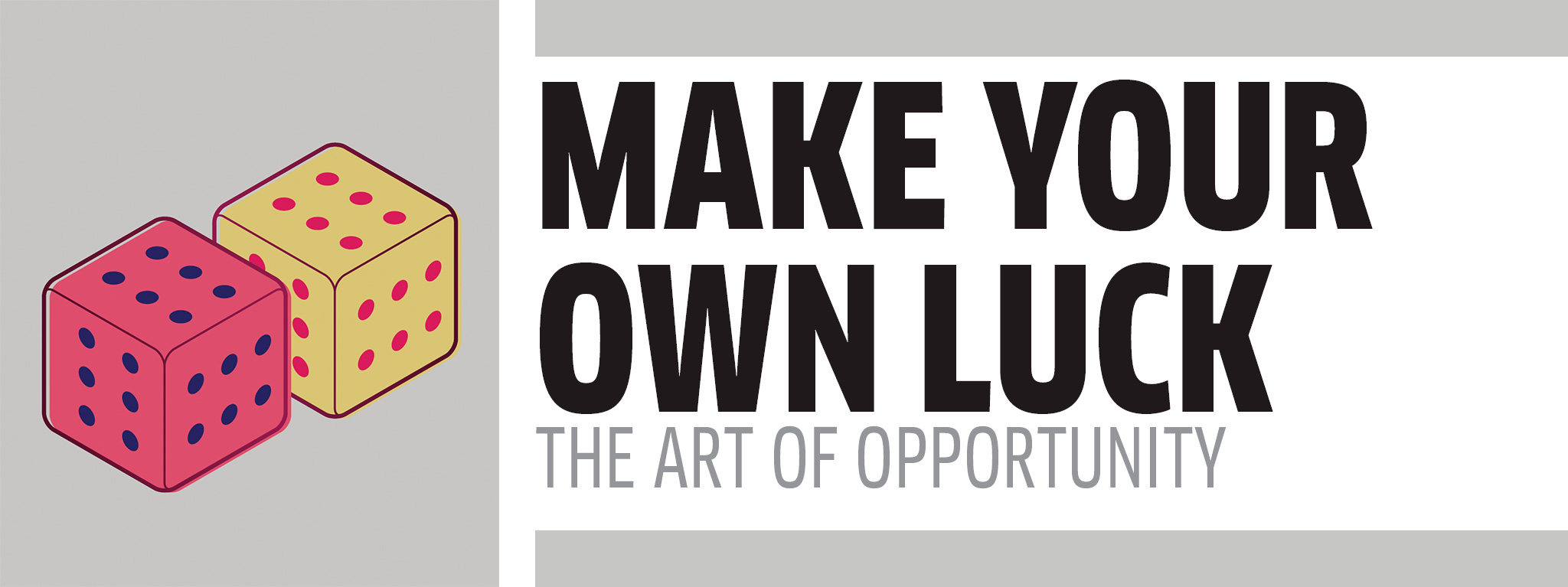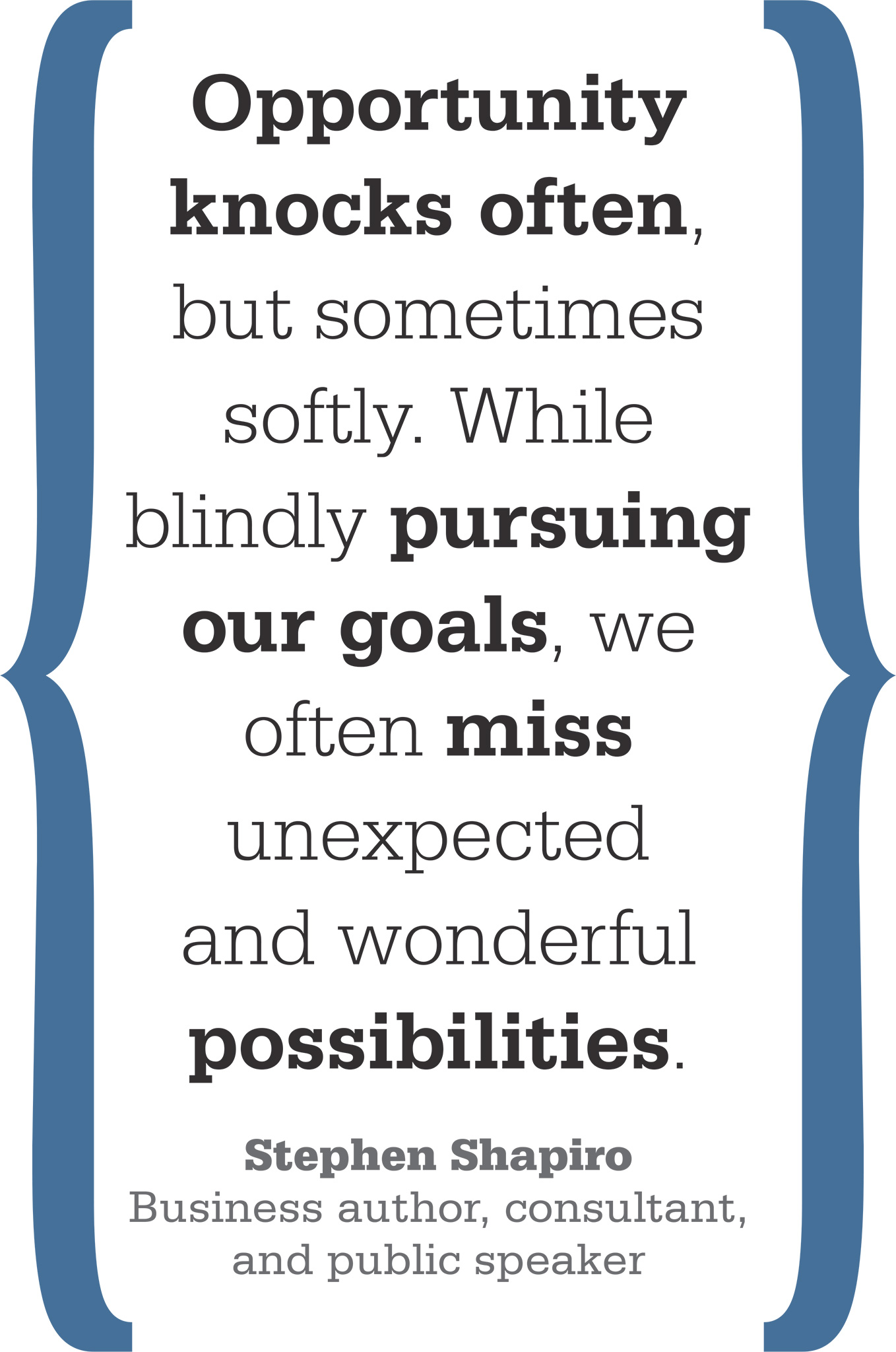
Some see luck as the key to success or as a reason for failure. A more balanced view is that good and bad luck will always play a part in our lives; the key is to think positively and spot the opportunities.
When an effort fails to bring about the desired rewards, it is sometimes tempting, or easy, to blame it all on bad luck. Those who do succeed over the long term, however, are unlikely to have been blessed with an uninterrupted run of good fortune; it is more likely that they have accepted that their enterprise will be affected by both ups and downs.
To be able to exploit good luck when it occurs, you need to cultivate a particular mindset. The most important thing is to be open to life’s manifold possibilities—the twists and turns of cause and effect. Seeing the potential of an opportunity encourages a positive attitude, which helps to engender success in the long term—even if some of the individual chances turn out to be dead ends.

Be open and receptive
American psychologist Carol Sansone makes the point simply. “What appears to be luck,” she writes, “is really the result of perceptions, personality traits, choices, and actions. And all that is within your control.” Those who benefit most from luck have been shown to include a high proportion of extroverts. Such people enjoy a richer weave of fortuitous encounters, simply because they are constantly making new acquaintances; they also tend to keep in touch with a wide range of people.
It helps to be curious about experiences you’ve never had, as well as curious about other people—especially those who do things beyond your range of experience. Initiating conversations and seeing where they lead can expose you to fresh perspectives and directions.
A willingness to experiment is also key. If you’re naturally cautious and worry too much about the unknown, you may be blocking opportunities for success before they have a chance to flourish. Relish new experiences: remember that if anxiety overwhelms curiosity, inertia is likely to be the result.

 the art of luck
the art of luck
Think of luck as an attribute you have to cultivate and encourage, or as an art you should learn and practice as part of your everyday life. The following techniques will help to improve the chances of new ideas and opportunities opening up for you:

The opportunity mindset
We all suffer setbacks, so how can you survive them best? Part of it is up to “cognitive framing”—that is, what we choose to notice, what we choose to dismiss, and how we understand and explain the broader situation to ourselves. These mental framings affect our decisions and choices: thinking that we are lucky can make us more proactive.
In the early 2000s, British psychologist Richard Wiseman performed a series of experiments with people who viewed themselves as either “lucky” (they were successful and happy, and events in their lives seemed to favor them) or “unlucky” (life just seemed to go wrong for them). What he found was that the “lucky” people were adept at spotting opportunities. In one experiment he told both groups to count the number of pictures in a newspaper. The “unlucky” diligently ground their way through the task; the “lucky” usually noticed that the second page contained an announcement that said: “Stop counting—there are 43 photographs in this newspaper.” On a later page the “unlucky” were also too busy counting images to spot a note reading: “Stop counting, tell the experimenter you have seen this, and win $250.”
Wiseman’s conclusion was that, when faced with a challenge, “unlucky” people were less flexible. They focused on a specific goal, and failed to notice that other options were passing them by. Wiseman identified four basic ways to encourage good fortune:
1 Create and notice chance opportunities.
2 Listen to your intuition—it’s more likely to guide you to a fortuitous decision.
3 Create self-fulfilling prophecies by thinking positively.
4 Be resilient: tell yourself you can turn bad luck around.
He found that when “unlucky” people adopted these strategies, they experienced an upswing in good fortune: they started being “lucky.” By following Wiseman’s methods, your odds of turning bad luck to good may be much improved.
Stretch your brain
Feeling stuck in a rut? Psychologist Clifford N. Lazarus suggests the following exercises to stimulate your thinking and provoke random opportunities:

 The Bank Robber Scenario
The Bank Robber Scenario
Picture this: you’re in the line at a bank, and an armed robber runs in, firing a gun. The bullet hits you in the arm. Now: were you lucky, or unlucky?
Psychologist Richard Wiseman put this scenario to both “lucky” and “unlucky” people—people whose lives seemed to be better or worse than each others’ when compared. Their answers are revealing:
- “Lucky” people tended to say they were very fortunate—after all, the bullet could have hit them somewhere fatal.
- “Unlucky” people tended to say it was terrible luck—and just typical that they were in the bank on that particular day.
The evidence suggests that people who greet misfortunes with an alternative picture of how things might have turned out worse tend to be better at coping and adapting when faced with unexpected challenges.
 good or bad, who knows?
good or bad, who knows?
Saeongjima, pronounced “say-ong-jay-mah,” is a Chinese–Korean saying that means “the horse of an elderly person living on the border.” The phrase comes from a parable in which an old man encounters a series of lucky and unlucky events. But whatever happens, the old man always shrugs off the congratulations or commiserations of his neighbors by saying, “Good or bad, who knows?”
The story goes like this: One day, the old man’s horse escapes and runs away across the border. It seems that it has gone forever, but soon enough it makes its way home again, accompanied by a splendid new horse. At the time this appears to be wonderful good fortune.
Months later, the old man’s son is badly hurt riding this new horse and ends up disabled, which at the time seems like terribly bad luck. However, the following year the son is spared from being drafted into a dreadful war because of this injury, and goes on to live a long and peaceful life.
In our own lives, events can have unforeseeable outcomes, so it’s always worth remembering “saeongjima”: one “unlucky” or missed opportunity might turn into a new and better one later.

 creating Good Luck
creating Good Luck
Psychologist Matthew Smith at Buckinghamshire New University in the UK is an expert in the psychology of luck. His research focuses on whether we can take positive action to make ourselves more fortunate, and he suggests five approaches:
1 Embrace the idea of luck. Not everything is predictable, and some things happen by chance. We seem to do better if we accept this and make the most of good fortune when it comes along.
2 Have a “lucky” mindset. When we think in a positive way, we make ourselves more confident and proactive, and our behavior and expectations make a difference to the events and outcomes we’re able to influence.
3 Be open to opportunity. By being relaxed, curious, and willing to try new things, we’ll be better able to see possibilities, and more comfortable taking risks.
4 Go with the flow. If you have specific dreams in mind, it may be uncomfortable stepping off the path you’ve chosen for yourself, but be prepared to let life surprise you.
5 Remember that things could be worse. When you’re feeling “unlucky,” consider that while things might not be perfect, perhaps they’re better than they could have been (see “The bank robber scenario,”).
